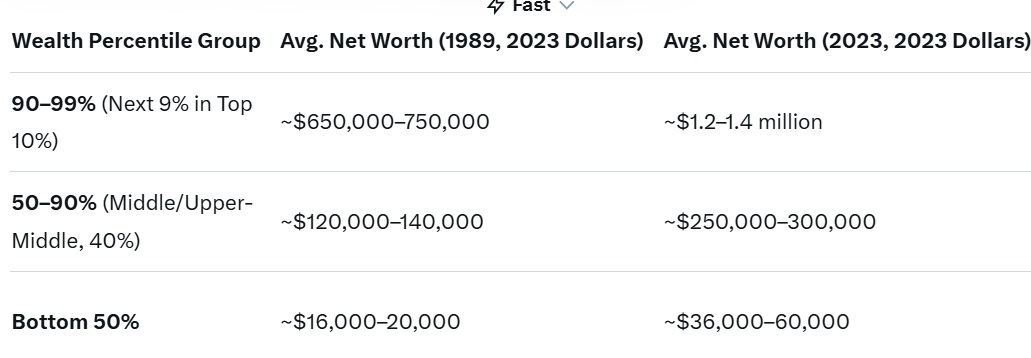Billionaire: Wealth “Inequality” Is Helping Invite Autocracy
 Diy13/iStock/Getty Images Plus
.ta-paywall-container {position: relative;display: flex;flex-direction: column; min-height:60px;}
#ta-paywall-overlay {position: absolute;top: 0;left: 0;right: 0;bottom: 0;display: flex;align-items: center;justify-content: center;z-index: 50;background: rgba(0, 0, 0, 0.5);}
#ta-paywall-overlay .trinity-player-iframe-wrapper .fab-view{display:none !important;}
Diy13/iStock/Getty Images Plus
.ta-paywall-container {position: relative;display: flex;flex-direction: column; min-height:60px;}
#ta-paywall-overlay {position: absolute;top: 0;left: 0;right: 0;bottom: 0;display: flex;align-items: center;justify-content: center;z-index: 50;background: rgba(0, 0, 0, 0.5);}
#ta-paywall-overlay .trinity-player-iframe-wrapper .fab-view{display:none !important;}
Equality tells you nothing about quality. You can, after all, have equality in misery, ignorance, degradation, or infirmity. Despite this, equality has long been a rallying cry for millions and inequality an explanation for a host of woes. And now billionaire hedge-fund founder Ray Dalio has joined this chorus, warning that wealth “gaps” are threatening “democracy” itself.
CT Insider reports on the story:
The NumbersSpeaking with the Financial Times, Dalio said that wealth disparity may lead to increased polarization which, in turn, leads to autocratic leadership….
“The increased wealth and values gaps lead to increased populism of the right and populism of the left and irreconcilable differences between them that can’t be resolved though the democratic process,” Dalio told the Financial Times. “At such times, democracies weaken and more autocratic leadership increases as a large percentage of the population wants government leaders to get control of the system to make things work well [for] them — e.g., ‘to make the trains run on time.’”
… Dalio compared current socioeconomics to “what happened around the world” before, during and after World War II.
“Like in the 1930 to ’40 period, the gaps in wealth, gaps in values, and views about what policy should be have become more extreme — and the willingness to compromise, lose elections because of voting results, and trust in the system have dwindled,” he said.
For sure, too, statistics bear out Dalio’s wealth analysis. As Investopedia informs:
Since 1989, the share of American household wealth held by the top 0.1% has increased by more than 60%. For comparison, all but those in the remaining top 1% of wealth saw their share of national income fall:
● The share of those in the 99% to 99.9% range increased about 20%.
● Those whose wealth is in the 90% to 99% range fell 4.1%.
● Those in the 50% to 90% range fell 17%
● The bottom 50% of the population has fallen about 46% in its share of the national wealth.
Damning? Well, while the above numbers appear accurate, they also don’t tell the whole story.
Before addressing the above, it should be acknowledged that, ours being an imperfect world, our economic world is also imperfect. For example, consumer prices rose markedly during the Biden administration — more than 20 percent overall during his four years. Bad policy was, too, of course, largely to completely responsible. Trillions of dollars were printed up, basically out of thin air, thus diluting our currency’s value. Simultaneously, trillions were dispensed in “stimulus” payments. This increased demand while supply was constrained, largely by government-mandated, “pandemic”-related shutdowns — more bad (and unnecessary) policy.
Note also regarding the latter that small businesses were forced to close for “health reasons.” Outrageously, however, major retailers such as Walmart were allowed to remain open. This constituted a stated-coerced wealth transfer from the middle class to the wealthy. Approximately 100,000 to 200,000 small businesses were permanently destroyed, too — and those responsible have never been held accountable.
The Numbers Behind the NumbersSo John Q. Public certainly has legitimate economy-oriented reasons to be revolution-minded. But is wealth share, per se, really one of them? Or is it just another example of inequality that tells us nothing about quality?
Well, the apocryphal saying “The only person worth feeling superior to is your former self” is relevant here. How rich a given group is compared to others, over time, is not a good measure. More relevant is: How rich is it relative to its former self?
To determine this, I used Grok AI to run an analysis on whether the groups cited as losing wealth share are richer or poorer now than in 1989 (in inflation adjusted dollars). Here’s what it found:
All three groups specified in the claim — 90-99%, 50-90%, and the bottom 50% — are richer in inflation-adjusted dollars than in 1989, with average net worth per household increasing due to overall economic growth, asset appreciation (e.g., housing, stocks), and population-adjusted gains. Data is sourced from the Federal Reserve’s Distributional Financial Accounts (DFA) and Survey of Consumer Finances (SCF), adjusted to 2023 dollars using the CPI-U-RS inflation factor (~1.85 from 1989 to 2023).
Below are the stats for average net worth per household in each group.
 Facts Don’t Change Hearts
Facts Don’t Change HeartsNone of this is to say that some people aren’t struggling or that our system couldn’t be improved. (Anything worldly can be.) It is to say that before prescribing remedies, we’d better know what’s the cure and what is the disease. As to this, our overall increasing wealth is the result of market-system activity. This is why we’re richer now than decades ago. It’s also why we will be richer some decades hence — if we don’t further hobble our market economic engine. Should we embrace socialism, however, all bets are off.
Yet it should also be said, again, that “equality” measures are foolhardy. Regarding this, consider an example I often use:
There are two tennis centers training children. After a certain period of time at the first, all the kids are advanced beginners. After the same period at the second, some are advanced beginners. Two other large groups constitute, respectively, low intermediates and intermediates. There’s a small group of advanced players, too, and a handful are approaching tournament caliber. At which center is there more equality?
Okay, now, at which are the children doing far better on average?
Let’s Keep Our Eye on the BallThis could be applied to anything, of course; and, with everything, equality tells you nothing about quality. Regarding wealth, it doesn’t matter if we measure up to Bill Gates or Elon Musk. What matters is that we can provide for our needs and for quite a number of wants, including leisure opportunities. And if our civilization’s lot also improves over time with the rising tide, we’ve much to be thankful for.
This said and as mentioned earlier, though, Ray Dalio does have a point. Why? It is unfortunately man’s nature, and especially that of those lacking in virtue, to compare oneself to others. And when propagandists in media and elsewhere beat the “equality” drum while failing to explain what I have above, they exacerbate the problem. They perpetuate destructive lies and half-truths, and envy’s fires are stoked. Envy can kill, too — including economies.
But, hey, should socialist agitators spark their revolution and then, ultimately, learn the hard way they were just useful idiots, they may be able to take solace in a certain reality. That is, prisoners in a gulag do tend to enjoy equal levels of liberty.